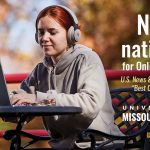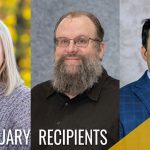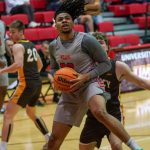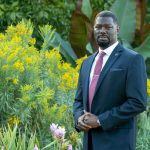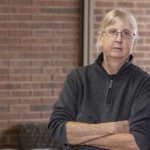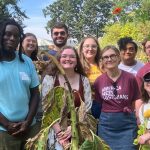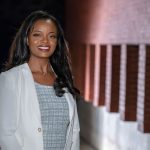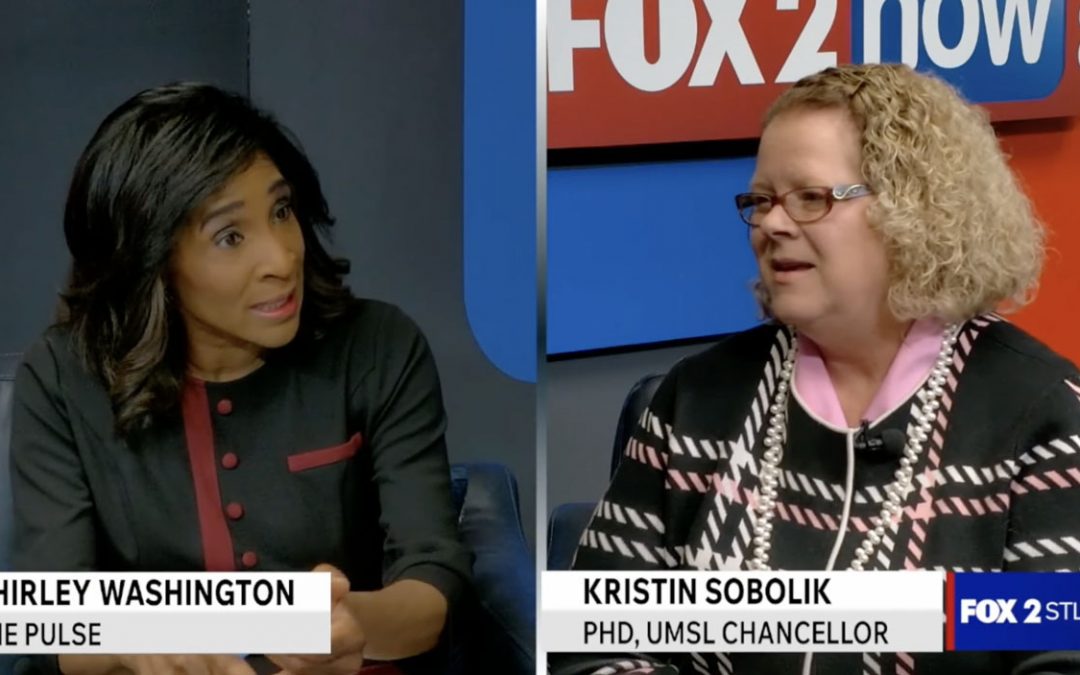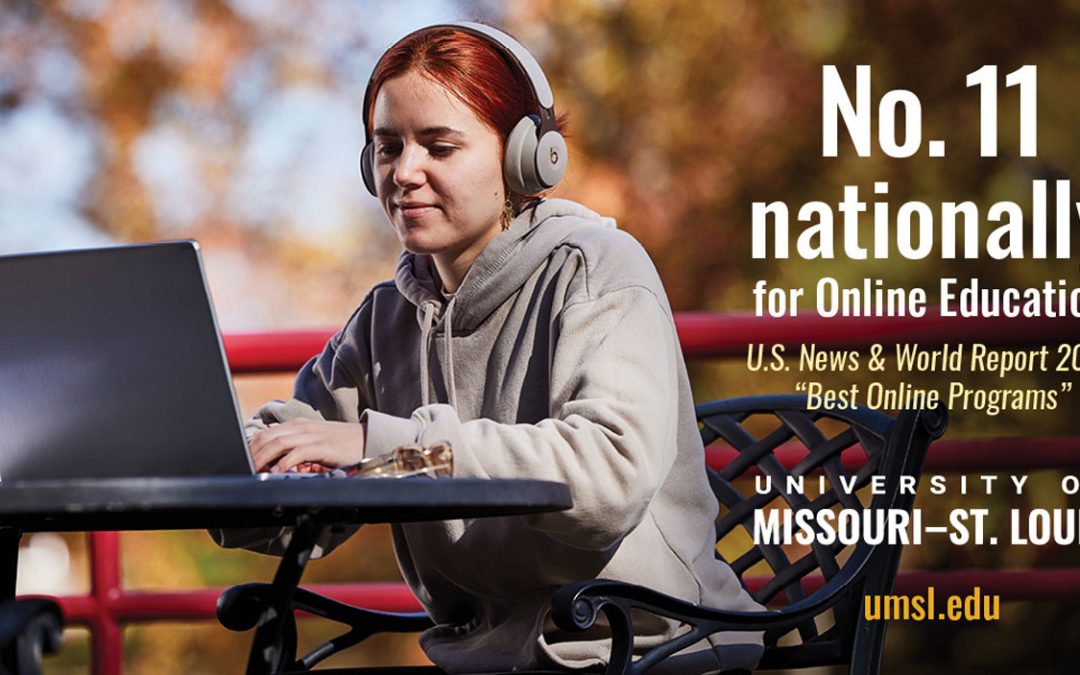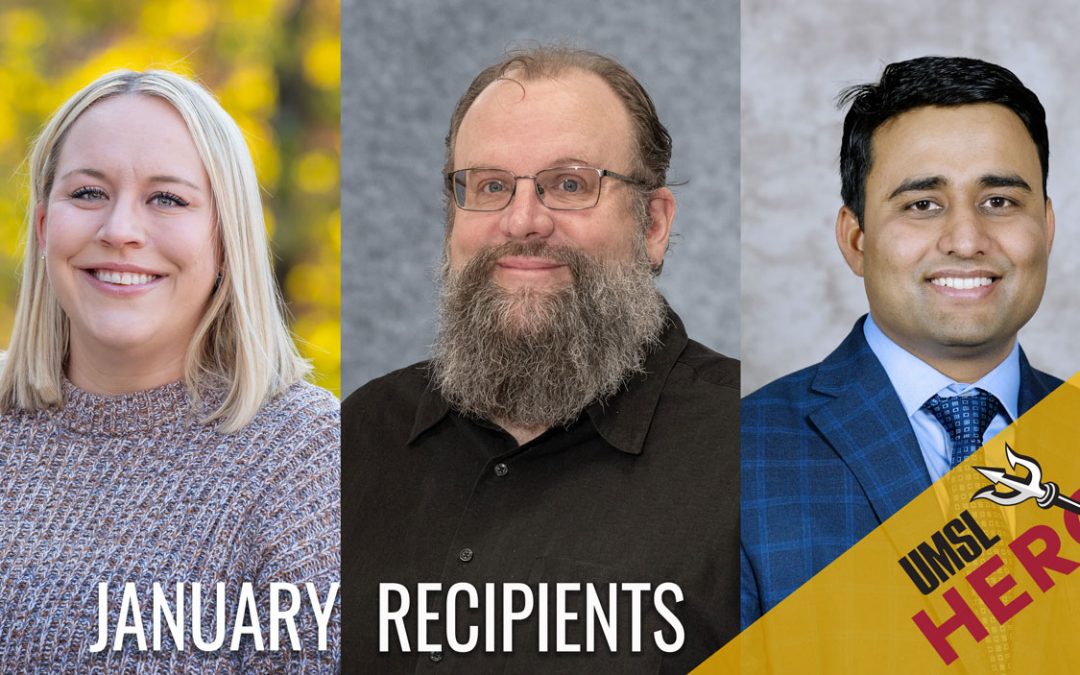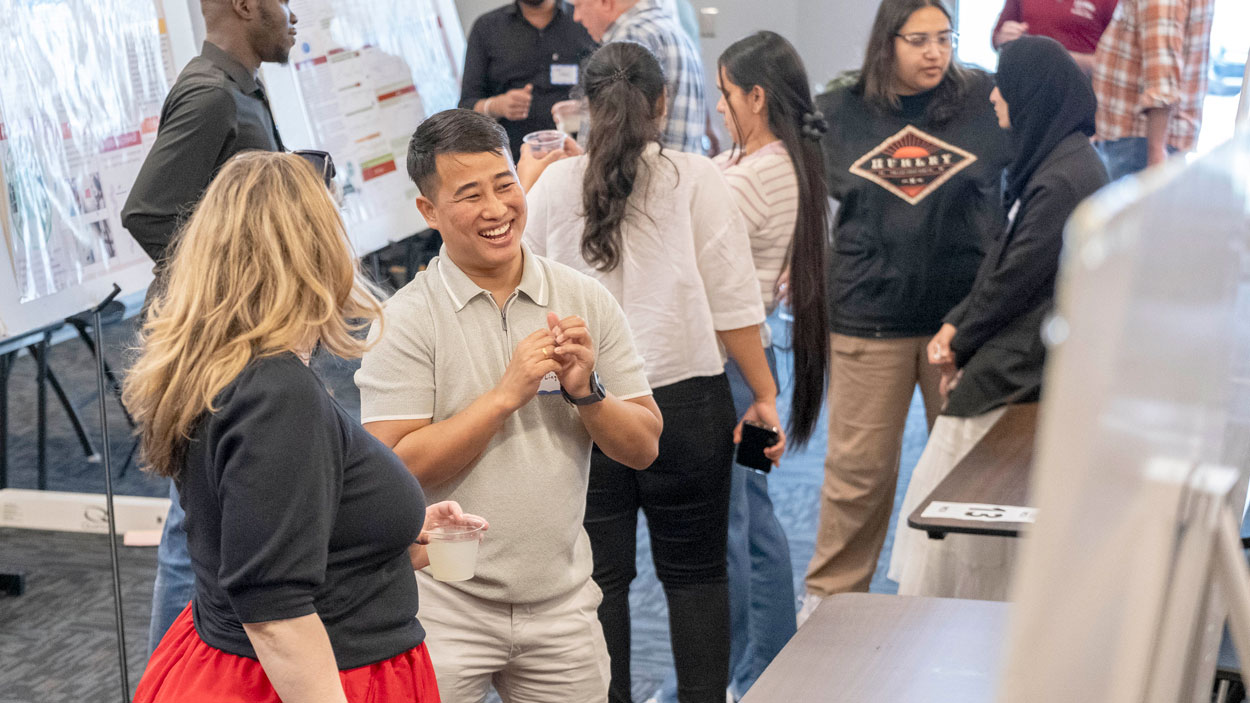
Chemistry PhD student Dhanbir Lingden speaks to Graduate School Director Amber Reinhart during last week’s Graduate Research Fair. Lingden won first place for his research presentation titled “A Simple Solution-Phase Synthesis of Nanoporous Gold Nanoparticles for LPS Biosensing.” (Photos by Derik Holtmann)
Paula Penagos Rodriguez has been fortunate to present her work at conferences around the country and as far away as Barcelona since she began pursuing her PhD in supply chain and analytics at the University of Missouri–St. Louis in 2022.
Next month, while attending the 35th Annual Production and Operations Management Society – or POMS – Conference in Atlanta, she’ll be showcasing research on people’s individual behavior responses to flash floods warnings and how it can help inform disaster management communication and action.
She seemed no less eager to display her work on an admittedly smaller stage at last Friday’s Graduate Research Fair in the Millennium Student Center.
“I think it’s really cool because we get to show the community what we do,” Penagos said. “That’s not something that really gets out. Our department knows, but other departments and other people and other students don’t really know what we do. We also get to know some other disciplines, some other studies that can even overlap, so it’s like networking.”
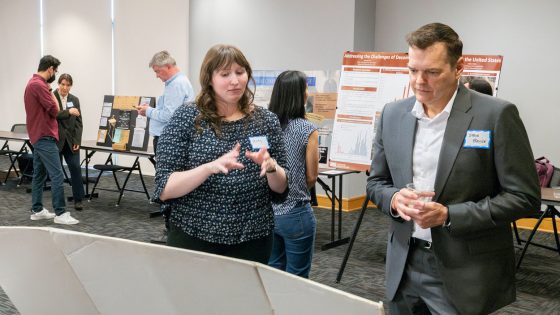
Clinical Psychology PhD student Mady Diehl talks to Professor Steven Bruce about her research titled, “Parent perceptions of the parent-child relationship in early childhood: Examining potential contributions and moderators.” Diehl won first place in the social sciences category.
Penagos stood beside a poster outlining her research, with an introduction about the issue of flash flooding and details about her data collection, the Protective Action Decision Model she used to explain how people decide to take protective actions during emergencies, and the conclusions she’s drawn from her analysis.
Only a few feet away, psychology PhD student Magda Martinez Mata was displaying her own poster on “Exploring Neural Distinctions between Parasocial and Real-Life Romantic Love: Insights from an Event-Related Potential Study Proposal.” Next to her, criminology and criminal justice PhD student Elle Lyne was discussing her research on “Dual Decision-Making: Gender Disparities in Ex Parte Civil Protection Order Cases.”
Across the room, there were students from chemistry, biology and computer science showing off work on everything from synthesis of nanoporous gold nanoparticles for biosensing lipopolysaccharides to desert fish making their homes in sinkholes to identifying Internet of Things devices and user activity through network traffic.
There were 29 students pursuing either PhDs or master’s degrees who took part in the research fair. They represented the departments of biology, chemistry and biochemistry, communication and media, computer science, criminology and criminal justice, English, political science, psychological sciences, and supply chain and analytics.
“It’s a time where they can really show what they’ve been doing and celebrate each other,” said Amber Reinhart, the senior director of the Graduate School. “Some of them will leave their station and go learn about the others. I think that’s great too. They get to see all the different things are going on.”
Entrants were divided into two groups – math, computer science and natural sciences in one, social sciences, humanities, business and education in the other. Faculty members Michael Nichols, Laika Satish Kannan and Sara Miller judged the first group while David Kimball, Kelsey Cundiff and Emily Gerstein judged the second, and they awarded prizes to what they deemed the top three presentations from each group with $500 going to the first-place selections, $300 for second place and $200 for third place.
For most, just the opportunity to present was reward enough.
“I really appreciate it because this work would just be stuck in one room,” said biology master’s student Zach Gerau, who was displaying his research on dipteran flies in their role as pollinators. “If they didn’t put on this fair for us, nobody will get to see our research because a lot of it doesn’t necessarily get published. We put a lot of time and effort into our projects, so this gives us an excellent platform in order to present that work as well.”
Many faculty members, including Professor Sanjiv Bhatia from the Department of Computer Science, make it a habit to encourage their students to register and participate in the fair each spring.
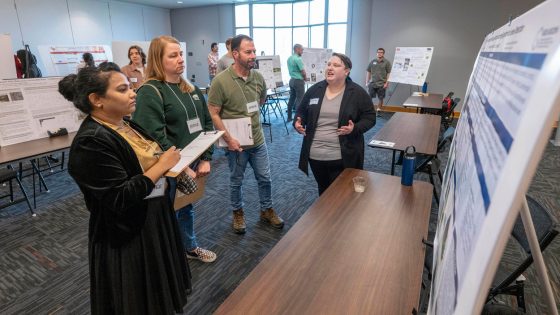
Computer Science master’s student Kel Gruber talks to judges Laika Satish Kannan, Sara Miller and Michael Nichols at last week’s Graduate Research Fair.
“This is one way to showcase their research and get some feedback from others,” Bhatia said. “The other thing here is they present it across all the disciplines, not necessarily just within their discipline. It might be a big stretch to present your research in sciences to somebody in the arts, but if you are in, let’s say, computer science and you are presenting to a chemist, these are scientifically literate people, so they should be able to present it to other people.”
It provides a good testing ground for other events. Computer science master’s student Kel Gruber has been working on developing a machine learning algorithm for detecting levees in images of the Earth, research connected to her internship at the National Geospatial-Intelligence Agency. She is slated to present that work again next month at the USGIF GEOINT Symposium next month at America’s Center in downtown St. Louis.
“This was just way to start practicing and get comfortable presenting,” she said. “I’ve never done a poster presentation before. I’ve gotten a lot of feedback from fellow presenters and from people coming through. Presentations are one of those things that you just need to get in and do some and realize, ‘Oh, this is how to do it better.’ I feel like this has been really helpful.”
Gruber wound up winning third place among the math, computer science and natural science contestants.
Chemistry PhD student Dhanbir Lingden won first place for his presentation on the synthesis of nanoporous gold nanoparticles for LPS Biosensing. Biology PhD student Casey Ernest earned second place for work on the desert fish living in sinkholes.
Psychology PhD student Mady Diehl finished first in the social sciences category for her research on “Parent Perceptions of the Parent-Child Relationship in Early Childhood: Examining Potential Contributions and Moderators.” Lyne finished second for her research on the gender disparities in ex parte civil protection order cases. Psychology PhD student Schyler Newman was awarded third place for her presentation on “Evaluation of a Contingency Management Pilot Program for Stimulant Use Disorder in Missouri.”




